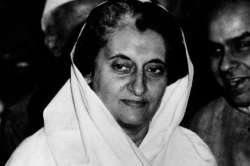When and what happened: Timeline of Emergency, the darkest phase of democracy in India
The legacy of the Emergency remains controversial -- till date -- and is more often than not referred to as the darkest phase of democracy in India.

June 25, 2019, happens to be the 44th anniversary of the Emergency imposed by former prime minister Indira Gandhi -- a period of over 19 months from 1975 to 1977.
The final decision to impose the Emergency was proposed by Congress leader, late Indira Gandhi, agreed upon by the president of India, and thereafter ratified by the cabinet and the parliament (from July to August 1975), and was based on the rationale that there were imminent internal and external threats to the Indian state.
The legacy of the Emergency remains controversial -- till date -- and is more often than not referred to as the darkest phase of democracy in India.
Let us have a look at what happened; how it happened and when exactly it happened.
June 12, 1975: The Allahabad High Court found former prime minister Indira Gandhi guilty of electoral malpractice. She was disqualified, and barred from holding the post of the prime minister for six years.
June 24, 1975: The Supreme Court granted a conditional stay on the high court's directive.
June 25, 1975: The then president, Fakhruddin Ali Ahmed, declared a state of emergency, a few minutes before midnight.
June 26, 1975: The Union Cabinet sanctioned the decision to impose the Emergency.
June 30, 1975: The MISA (Maintainance of Internal Security Act) was amended, through an ordinance, and the detention of any person who opposes the government without any trial was allowed.
July 1, 1975: The then prime minister, Indira Gandhi, introduced a 20-point programme for economic and social reform.
July 5, 1975: Twenty-six political organisations, including Rashtriya Swayamsevak Sangh (RSS) and Jamaat-e-Islami, were banned.
July 23, 1975: The Rajya Sabha voted in the favour of the Emergency and the next day, the Lok Sabha also passed it.
August 5, 1975: The Central government imposed MISA and arrested over one lakh people including leaders like Atal Bihari Vajpayee, LK Advani, Arun Jaitley, Vijayaraje Scindia, Siddaramaiah and K Stalin
January 9, 1976: The government suspended seven freedoms guaranteed by Article 19 of the Constitution of India.
February 4, 1976: The Lok Sabha was extended by one year.
November 2, 1976: The 42nd Constitutional Amendment Bill passed in the Lok Sabha for making the country socialist, secular and republic.
January 18, 1977: Fresh Lok Sabha election was announced.
January 20, 1977: The existing Lok Sabha was dissolved.
January 24, 1977: Under the leadership of Morarji Desai, Janata Party was launched by the Opposition.
February 11, 1977: The then president, Fakhruddin Ali Ahmed, died.
March 16, 1977: The Janata Party, with allies, won 345 seats in the general election.
March 21, 1977: The Emergency was officially withdrawn.
March 24, 1977: Morarji Desai was sworn in as the new prime minister of India.
ALSO READ | Budget 2019-20: Interesting facts about the history of Union Budget in India
ALSO READ | Ayushman Bharat Yojana: Check how to avail for insurance cover, entitlement, other details